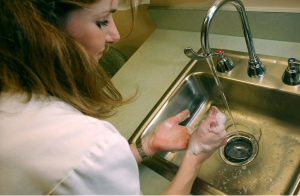Hospitals Enforce Hand-Washing to Reduce High Patient Death Rate from In-House Infections
 (photo: John Amis, AP)
(photo: John Amis, AP)
With deaths and associated costs rising, hospitals are forcing medical staff to improve a vital, but often neglected, task that helps avoid the spread of infection: washing your hands.
Federal health officials say drug-resistant superbugs are increasingly showing up in hospitals, killing about 100,000 patients and costing $30 billion a year. One way to combat this problem is for nurses, doctors and other personnel to make sure they wash their hands regularly.
But this simple procedure is often ignored. In fact, without encouragement, hospital workers clean their hands as little as 30% of the time that they interact with patients, The New York Times reported.
So, some hospitals are resorting to electronically tracking the movements of nurses and doctors and reminding them, if they forget, to wash before handling the next patient.
At one medical facility—North Shore University Hospital on Long Island—intensive care units are equipped with motion detectors that activate a video camera every time someone enters. The image is instantly transmitted to a surveillance team in India, whose job is to ensure that all who enter the ICU wash their hands.
Other hospitals use hand-wash-tracking electronic badges, radio-frequency computer chips located at sinks to identify passing doctors, and undercover “spies”—disguised in white medical garb—to monitor hand-washing patterns of staff. Some even use a reward system of discount food coupons or cash bonuses to encourage good hygiene.
Numerous medical professionals have been caught trying to cheat the system, finding ways to bypass the electronic monitors. Those who avoid hand-washing are sometimes issued red penalty cards or made to attend—and subsequently teach—a four-hour infection prevention class.
One study based on hidden-camera footage recorded at a hospital revealed only 10% of the staff washed their hands. That 70% or more of hospital workers fail to comply with the practice is attributed to the high-pressure environment, the tedium of washing, the tendency to focus on difficult rather than simple tasks, and resistance to authority—particularly by doctors who feel they already hold the highest level of authority.
Hospitals have a strong financial incentive to minimize the risk of preventable infections from spreading within their facilities—the federal government will now cut their Medicare funding if they don’t act.
-Danny Biederman, Noel Brinkerhoff
To Learn More:
With Money at Risk, Hospitals Push Staff to Wash Hands (by Anemona Hartocollis, New York Times)
Replace Hand Washing with Use of a Waterless Alcohol Hand Rub? (by Andreas F. Widmer, Clinical Infectious Diseases)
Hand-Washing Key to Preventing Infections in Hospitals and Clinics - UN Agency (UN News Centre)
Decontaminating Patients Cuts Hospital Infections Dramatically (Associated Press)
Hospitals Vastly Underreport Infections Contracted In-House (by Ken Broder, AllGov California)
- Top Stories
- Unusual News
- Where is the Money Going?
- Controversies
- U.S. and the World
- Appointments and Resignations
- Latest News
- Trump Renames National Football League National Trump League
- Trump to Stop Deportations If…
- Trump Denounces World Series
- What If China Invaded the United States?
- Donald Trump Has a Mental Health Problem and It Has a Name






Comments